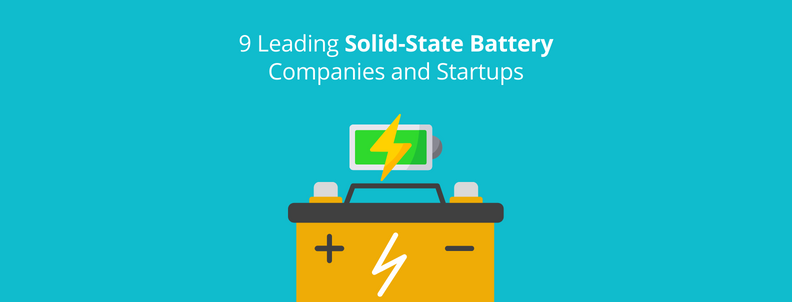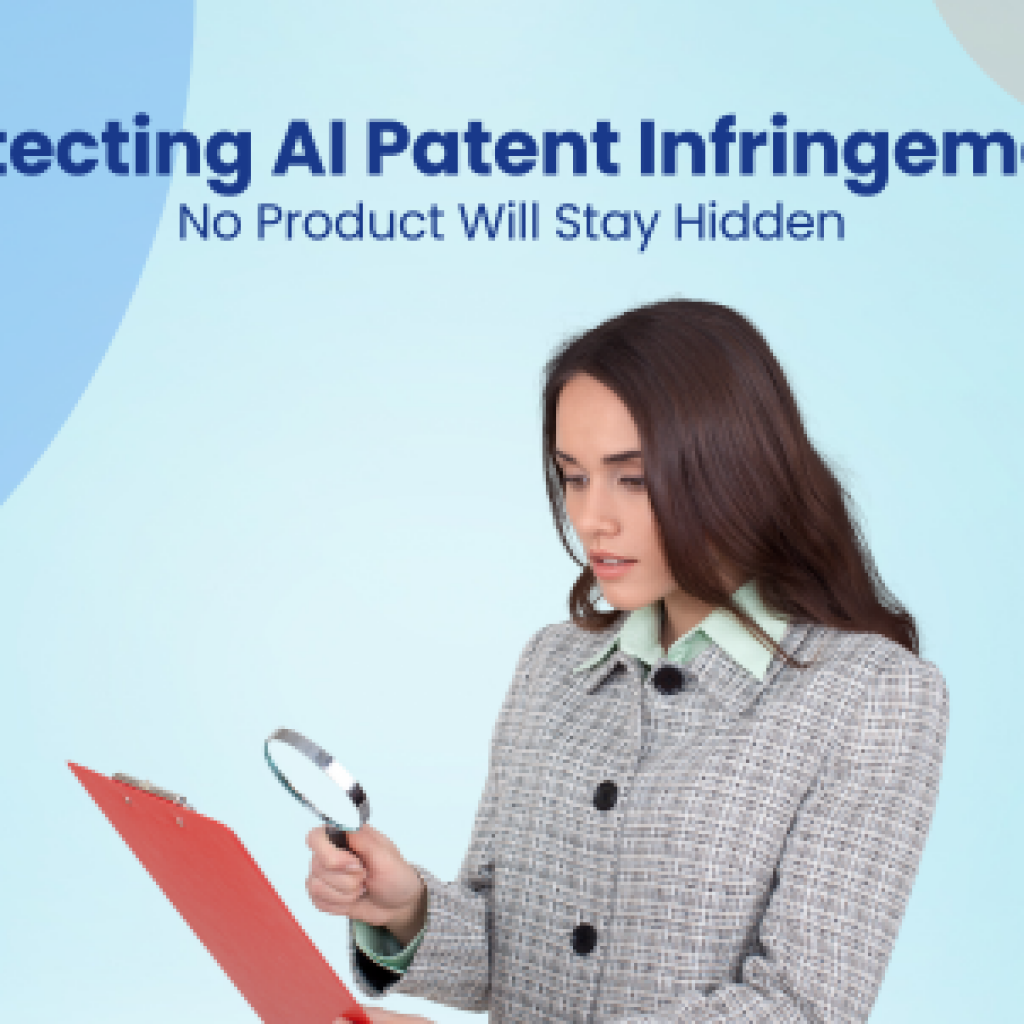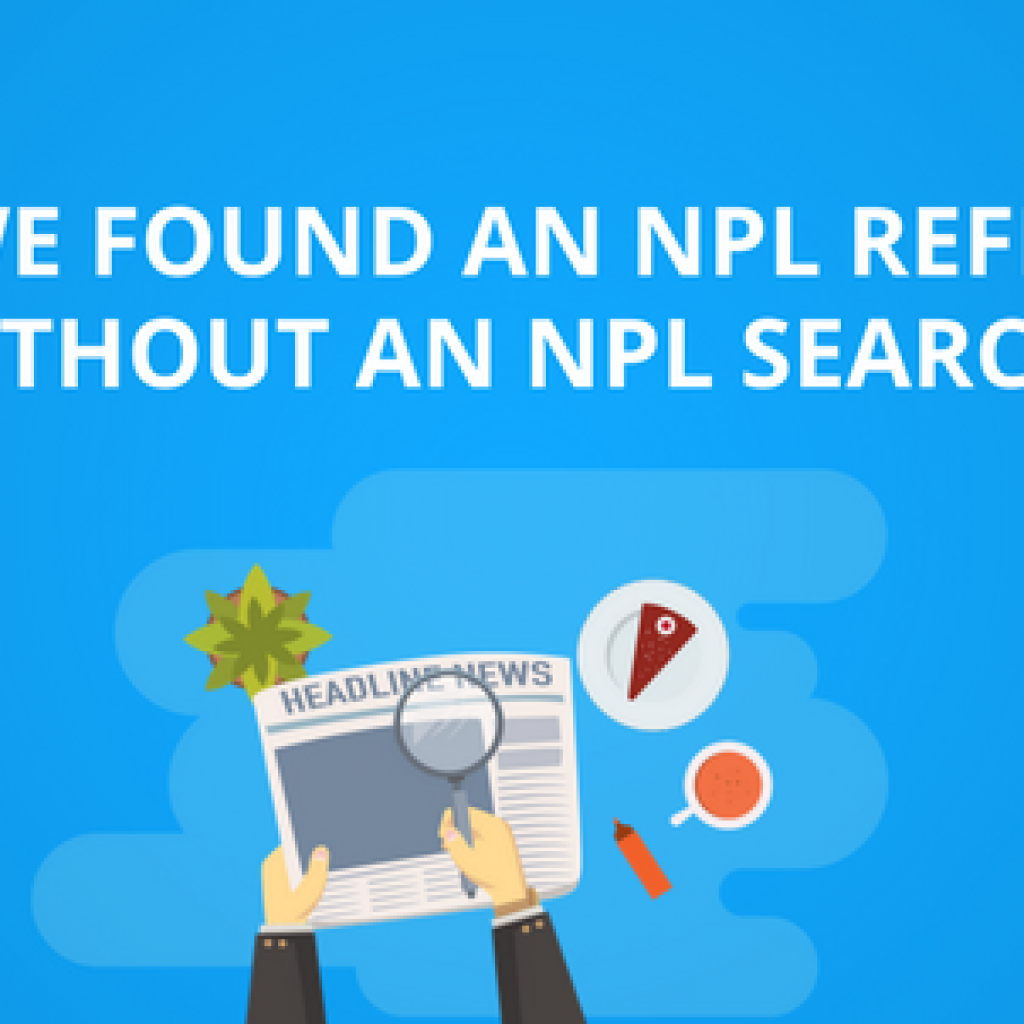In Oct 2022, researchers at NASA announced their progress in their solid-state battery technology. These battery packs will be lighter, safer, and performs better than the batteries used in vehicles now. NASA’s solid-state battery has twice the energy density of a typical electric car’s lithium-ion battery because all of its cells are contained in one casing.
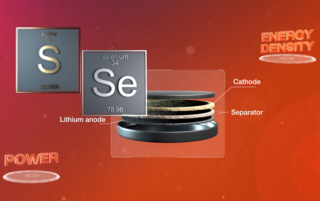
For better comparison, NASA’s solid-state battery has a whopping 500 Wh/kg energy density, while Tesla’s 4680 batteries in the Model Y boast 300 Wh/kg energy density. (Source)
It’s no surprise that NASA’s researching solid-state batteries instead of Li-ion batteries. If you are working in this domain, you know that solid-state batteries are a far better solution to the problem of storing as much energy as possible for as long as possible with total safety and instant deliverability.
The solid electrolyte takes up far less space than the liquid version found in existing lithium-ion batteries. That makes the whole thing much more compact with a much higher energy density, potentially as much as three times that of a standard lithium-ion battery.
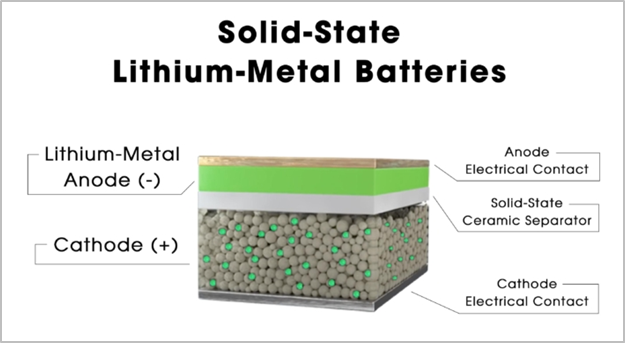
Properties like these attracted many EVs and energy storage systems (ESS) players to Solid State Batteries (SSB).
The research on SSB has been going on for some time now. A couple of years ago, there were very high hopes that we would see these lightweight high energy density units powering mass-produced electric vehicles by about now. But it hasn’t happened yet.
Regardless, more companies are researching it for different purposes. While Nasa wants to use SSB to improve air mobility, other companies seek SSB properties to improve energy storage systems. (Source)(Source)(Source)
Despite all these advantages, SSBs still have some significant challenges to solve. We have discussed those challenges later in this article. However, if companies (like yours) solve these issues, it would be a massive step for the EV and Energy Storage industries.
SSBs are one of the trends of Energy Storage. If you are interested in knowing about all 10 Energy Storage trends in 2023, fill out the form below to get the report.
Market Size of Solid-State Battery
In 2021, the global solid-state battery market was valued at $805 million ($0.80 billion) and was expected to increase and reach $13.15 billion by 2030. The market is anticipated to grow at an approximate CAGR of 36% during the forecast period. The use of solid-state batteries in electric cars is one of the primary growth prospects for the solid-state battery market. Demand for solid-state batteries is predicted to increase as the automobile sector in India, China, Japan, and South Korea expands rapidly. (Source)(Source)
Global Solid-State Battery Market Size during 2021-2030 ($Billion)

But before we deep dive into the future of solid-state batteries, let’s talk about the advantages of SSB and the challenges companies need to overcome to unlock its full potential.
Advantages of Using Solid-State Battery
Greater safety
Solid-state batteries are much safer than Li-ion batteries. This is because SSBs don’t have a liquid electrolyte, one of the most troublesome components in lithium-ion batteries, as they’re volatile and thus more combustible. Instead, Instead, SSBs are altered by a thicker separator layer made of a material structurally more resistant to high temperatures. It improves the separation between the anode and cathode, preventing short circuits even in the occasion of misuse or degradation, thus increasing the intrinsic safety of the cells.
Keeping track of energy density
Solid-state batteries possess an energy density of 2-2.5 times that of existing lithium-ion technology. This makes it a lighter and more compact battery. In addition, the increased inherent safety contributes to another significant improvement, i.e., using a pure metal anode promotes a substantial boost in energy density. During the transfer in a solid-state battery, the ions stay, and a bulky, heavy chemical portion that does not actively help create energy is removed.
Ultra-fast charging times
Solid-state batteries can charge up to six times more quickly than existing technology on the market. Existing solid-state battery models charge very fast but at the expense of other critical performance parameters. (Source)(Source)(Source)
Challenges of Solid-State Battery
Presence of substitutes
Graphene batteries, fluoride batteries, sand batteries, ammonia-powered batteries, and lithium-sulfur batteries are replacements or substitutes for solid-state batteries. Fluoride batteries have the potential to run up to eight times longer than solid-state batteries. The new lithium-ion battery uses silicon instead of graphite to achieve three times the performance of the existing graphite Li-ion batteries. During the forecasted period, all of these batteries limit the expansion of the solid-state battery market.
Complicated manufacturing process
Solid-state battery production procedures and methods are complicated. During the creation of these batteries, suitable production tools are required for highly precise material deposition. Solid-state batteries are made by systematically arranging electrodes separated by solid electrolytes. These non-porous solid electrolytes must be able to prevent dendrite growth between electrodes. As a result, solid-state battery producers must constantly focus on research and development efforts linked to these batteries to analyze the difficulty of the production process of solid-state batteries. (Source)(Source)
Solid-State Battery Companies
1. QuantumScape
QuantumScape is a company that is working to commercialize solid-state batteries for use in electric vehicles. Unlike traditional lithium-ion batteries that use a liquid electrolyte to move ions between the electrodes, solid-state batteries use a solid electrolyte, which provides several advantages, including higher energy density, longer battery life, and faster charging times. (Source)
QuantumScape is developing a unique type of solid-state battery that uses a ceramic electrolyte, which has a much higher conductivity compared to other solid electrolytes. This allows for a more efficient flow of ions, which translates to a higher energy density and longer battery life. The company is also working on a novel manufacturing process that enables the mass production of these batteries at a lower cost compared to traditional lithium-ion batteries.
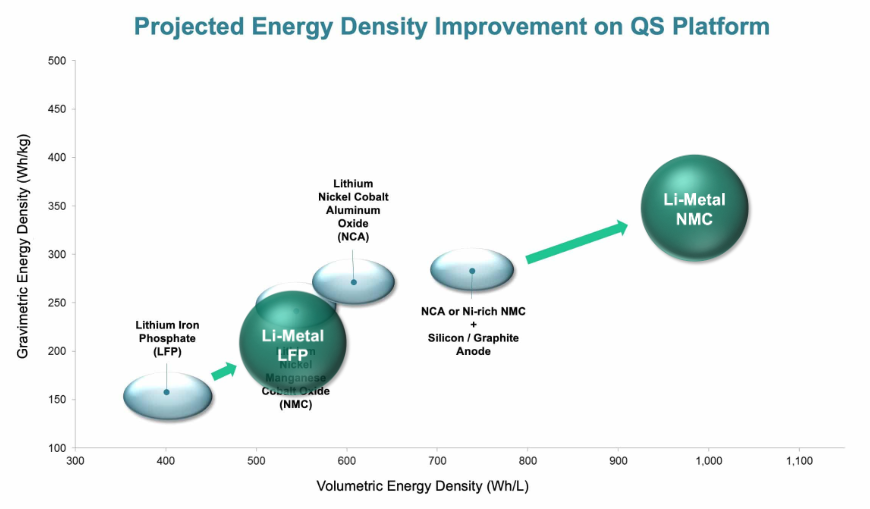
Another area where QuantumScape is innovating is in the use of a layered cathode structure, which provides a more stable and consistent flow of ions, which leads to a more reliable and consistent performance of the battery. The company is also using advanced materials science to develop new and innovative cathode materials that have a higher energy density compared to traditional cathode materials.
Overall, QuantumScape is at the forefront of developing solid-state batteries, which are considered to be the next-generation of batteries for electric vehicles. The company’s innovative technology and materials science approach has the potential to greatly improve the performance, range, and charging times of electric vehicles, which could greatly contribute to the growth and adoption of EVs.
2. Cymbet Corporation
Cymbet Corporation, headquartered in the United States, is a leader in solid-state energy storage solutions for microelectronic systems. The company is the first to commercialize eco-friendly, biocompatible rechargeable solid-state batteries. This gives electronic system designers additional embedded power capabilities. In addition, the EnerChipTM batteries from the company enable new ideas in energy storage applications for ICs and unique solutions for medical, sensor, RFID, industrial control, communications, and portable electronic devices.
Their solid-state batteries EnerChipTM are made using semiconductor fabrication technologies to provide a rechargeable energy storage device that does not include any liquids, gels, or hazardous chemicals. Additionally, the EnerChipTM devices can be packed as a regular semiconductor component and co-packaged with other integrated circuits.
Cymbet has a diverse patent portfolio that covers patentable aspects of materials, design, production, and applications. (Source)(Source)
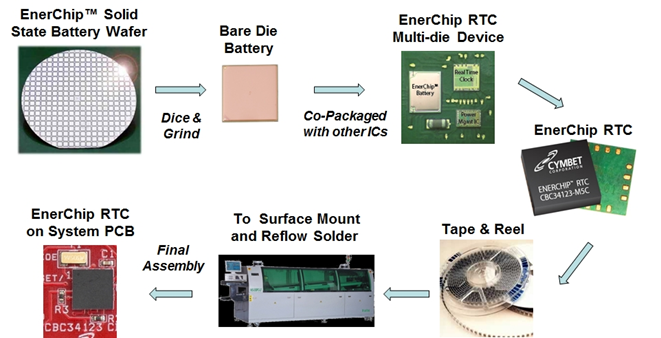
Important Collaborations
In 2020, Axzon and Cymbet Corporation announced a collaboration to develop the world’s lowest power Internet of Things (IoT) sensor tag at a price point that enables constant monitoring and information logging of critical environmental factors during the logistics chain of perishable goods.
This ground-breaking sensing system includes Axzon’s Xerxes-II semi-passive data logger sensor IC for monitoring and recording temperature, pH, moisture, strain, and other environmental factors with Cymbet’s EnerChip solid state micro-battery. (Source)
3. Prieto Battery
Based in the United States, Prieto Battery aims to develop a solid-state battery that is safe, has more energy and faster charging, is longer lasting, cheaper, and can be utilized in various applications and devices. (Source)
The 3D Full Cell from Prieto is a single device that combines ultracapacitor power and Li-ion energy storage. The device can decouple energy and power density and tailor it to each application, which is unachievable with a 2D structure. (Source)
Prieto intends to offer its 3D anode as a standalone product as a drop-in substitute for traditional anodes such as graphite. In the fall of 2019, these cells passed third-party safety testing and are an ideal solution for enabling Li-ion battery chemistry in medical devices where safety is critical. (Source)
Working Principles of Prieto 3D Batteries
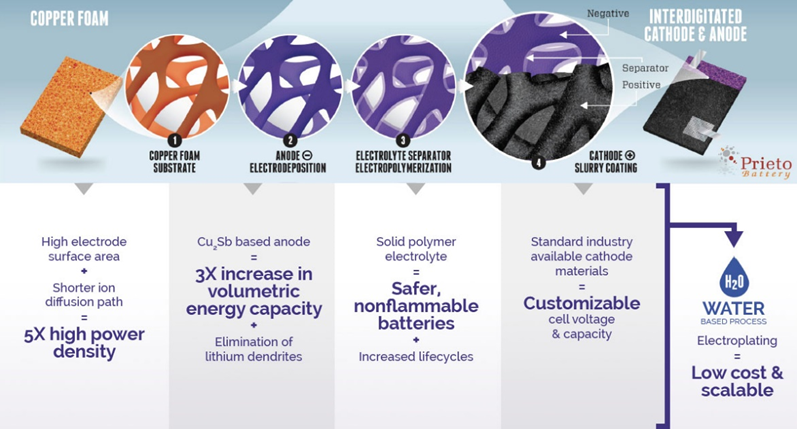
Important Collaborations
Hercules Electric Vehicles and Prieto Battery, Inc. announced in 2020 that they had signed a Letter of Intent to form a strategic partnership to develop and commercialize Prieto’s 3D Lithium-ion solid-state batteries for use in Hercules electric pickups, SUVs, and other upcoming vehicles commencing in 2025. (Source)
4. BrightVolt
BrightVolt, based in the United States, is a leader in developing solid-state thin and flexible lithium polymer batteries. The company has sold approximately 15 million primary/non-rechargeable solid-state batteries globally. In addition, BrightVolt is currently working on a ground-breaking new “platform” solid-state polymer electrolyte for application in Secondary/Rechargeable Lithium-Ion batteries used in Consumer Electronics and e-Mobility applications.
The company’s patented Polymer Matrix Electrolyte (PME®) technology enables batteries with 25% more energy density than existing Lithium-ion batteries while also making them cleaner, safer, and more ecologically friendly, all at a lower overall cost of manufacture. (Source)(Source)(Source)(Source)
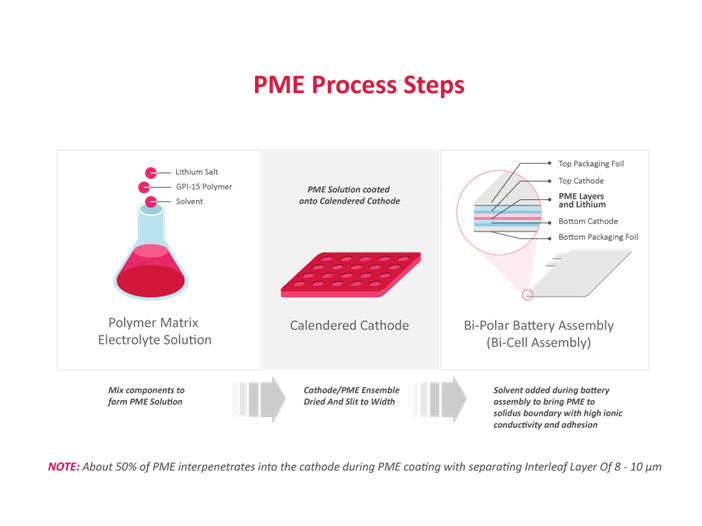
Solid-State Battery Startups
1. Theion
Theion, headquartered in Germany, manufactures zero-emission, quasi-solid-state lithium/sulfur and silicon/sulfur battery utilizing nano-crystalline monoliths. (Source)
The company is growing a pure Sulfur wafer using its Direct Crystal Imprinting (DCi) technology (no slurry coating, solvents, water, and drying). A proprietary solid-state polymer electrolyte is operating in the gaps of Theion’s Sulfur wafer. The startup uses lithium metal foil as an anode in the Gen 1 and Gen 2 Crystal cells. Their Technology Roadmap includes other anode designs (Gen 1 to Gen 4). To enhance energy and power content in such cells, the company’s cell technology is adaptable to bipolar cell arrangements. (Source)
Important Collaborations
The Coretec Group, Inc. formed a strategic alliance with Theion in 2020. Theion is exploring Coretec’s Cyclohexasilane (CHS) technology as a crucial material in its battery technology. The startup intends to use its unique characteristics to produce Quasi Solid-State Batteries (QSSB). This next-generation battery would soon outperform all liquid electrolyte batteries. Coretec would be a development partner and a key material supplier to Theion due to the collaboration. (Source)
2. Sakuu
Sakuu, headquartered in the United States, is innovating large-scale, environmentally friendly battery technology and manufacturing. Proprietary solid-state electrolyte and porous anode technology provide superior energy densities for maximum range and faster charge times.
The startup rapidly prints these solid-state batteries in agile gigafactory settings from the transformational KavianTM platform. This enables mass-scale, cost-effective, and sustainable production to fulfill global cell demand.
Swift PrintTM solid-state batteries from the company provide best-in-class performance and safety in a recyclable and customizable package. (Source)(Source)
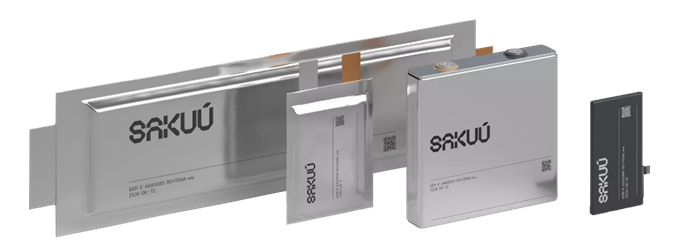
Important Collaborations
Sakuu established a memorandum of understanding (MOU) with Japan’s NGK Spark Plugs in 2022. The MOU would allow NGK to co-develop and supply ceramic materials for Sakuu’s solid-state battery production, ranging from current battery material requirements at Sakuu’s California pilot line facility through at-scale commercialization for its AM solid-state battery line. (Source)
3. Solid Power
Based in the United States, Solid Power is a market leader in all-solid-state rechargeable batteries for electric vehicles portablebile power industries. Solid Power replaces a standard lithium-ion battery’s flammable liquid electrolyte with a proprietary sulfide solid electrolyte. As an outcome, Solid Power’s all-solid-state cells are safer and much more stable across a wide temperature range. They can provide a 50-75% increase in energy density over the best available rechargeable batteries. (Source)(Source)
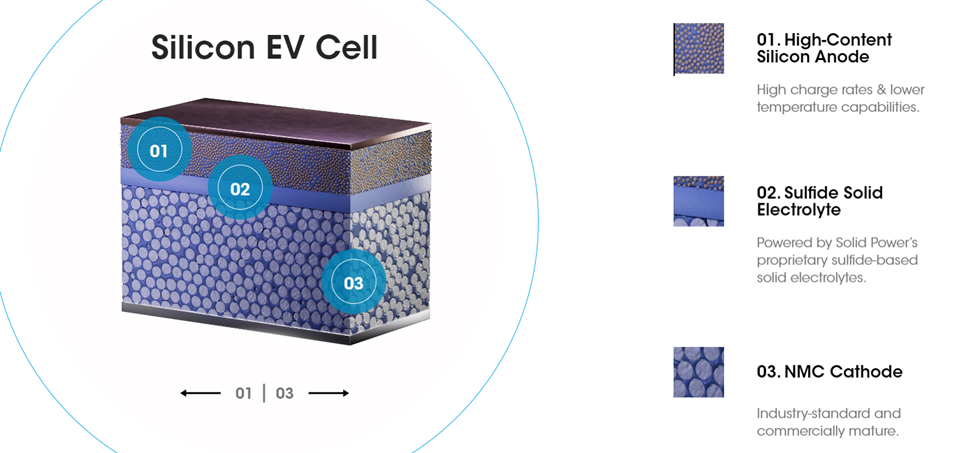
Important Collaborations
Under a memorandum of understanding (“MoU”) and joint development agreement (“JDA”) signed in 2021, Solid Power, Inc. entered into a partnership with SK Innovation Co to manufacture automotive-scale all-solid-state batteries. The collaboration is intended to enable the validation of Solid Power’s all-solid-state cell research and production procedures as part of the industry-standard automotive qualifying process.
According to Doug Campbell, CEO and Co-Founder of Solid Power, “The partnership with SK Innovation is designed to validate that Solid Power’s all-solid-state production processes are scalable and compatible with existing lithium-ion production technology. The ability to collaborate with a global leader in lithium-ion cell production is key to our go-to-market strategy and meet anticipated demand.” (Source)
4. Ion Storage System
Headquartered in the United States, Ion Storage Systems develops batteries that are safer, lighter, and allow for form factors with tighter packing density, all of which improve system performance.
ION is the only Solid-State technology that meets the ARPA-E and DOE VTO Fast-Charge targets for Li-cycling current density at room temperature. The company uses non-flammable, low-cost materials and owns patents for the same. Due to this unique arrangement, they can use the dense ceramic electrolyte as a separator. (Source)(Source)
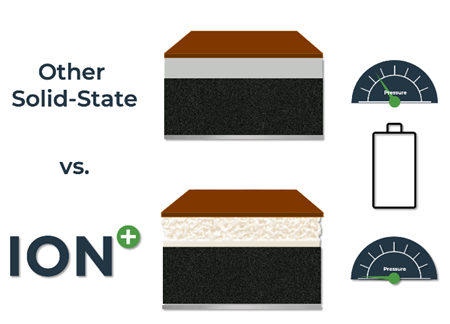
5. Natrion Inc.
Natrion, based in the United States, develops safe, high-performance, highly scalable solid-state battery technology to accelerate the adoption of mass-market-viable electric vehicles and renewable energy. (Source)
Natrion offers innovative Lithium Solid Ionic Composite (LISIC) solid-state electrolyte. Natrion’s innovations in solid-state lithium-ion and sodium-ion battery chemistries enable the company to overcome the inherent fire safety risk and high cost of traditional lithium-ion battery technologies.
Natrion’s LISIC battery technology paves the way for the next generation of battery-powered warfare. Soldiers can access man-portable, subdivisible, decentralized, and safe power. Natrion is currently building a full portfolio of battery solutions to significantly redefine the role and capability of electric power in military applications, benefiting from their core solid electrolyte technology’s exceptional chemical stability. (Source)
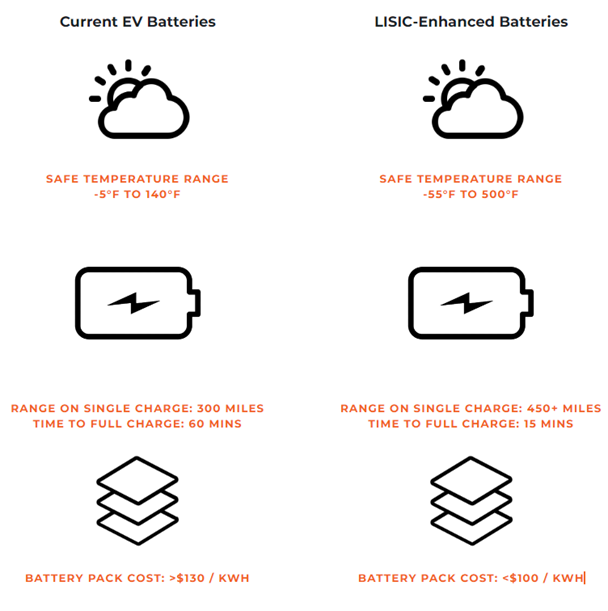
Conclusion
Investments in Solid State Batteries are boosting. Not just battery makers but automotive companies are also investing in SSBs technology. Moreover, Solid State Battery startups are also collecting funding to improve SSBs for different applications.
In May 2022, Solithor, an SSB developer, raised €10mn in investment from seed financing. The startup uses it to develop, manufacture, and commercialize solid-state lithium battery cell technology to provide high-energy storage solutions. (Source)
Another Solid State Battery Startup called ProLogium got investments in two funding rounds this year. In Jan 2022, they got €100M in funding in a private equity round. Further, in Jun, they got another undisclosed investment in a corporgameound. (Source)
While some organizations are still trying to improve it, companies like Samsung SDI have already mapped production plantations.
In March 2022, Samsung SDI announced that it had started building a pilot facility to test its production technology. The facility may begin production in early 2023. The company also plans to speed up its commercial-scale production, which was previously scheduled to start in 2027.
So, in the next one or two years, we will see more improvements in Solid State Batteries. In fact, there is a chance that the commercialization of these batteries will soon begin.
Authored By: Vipin Singh, Market Research
Author’s Note: With countless developments in battery technology, I deep-dived into the battery domain to share my findings on this blog. In my previous article, I shared the leading innovators in battery storage. Samsung SDI, Vanadis Powers, and Fluence, a leading startup, are some interesting names to check out.

